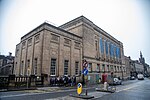Greyfriars Kirk (Scottish Gaelic: Eaglais nam Manach Liath) is a parish church of the Church of Scotland, located in the Old Town of Edinburgh, Scotland. It is surrounded by Greyfriars Kirkyard.
Greyfriars traces its origin to the south-west parish of Edinburgh, founded in 1598. Initially, this congregation met in the western portion of St Giles'. The church is named for the Observantine Franciscans or "Grey Friars" who arrived in Edinburgh from the Netherlands in the mid-15th century and were granted land for a Friary at the south-western edge of the burgh. In the wake of the Scottish Reformation, the grounds of the abandoned Friary were repurposed as a cemetery, in which the current church was constructed between 1602 and 1620. In 1638, National Covenant was signed in the Kirk. The church was damaged during the Protectorate, when it was used as barracks by troops under Oliver Cromwell. In 1718, an explosion destroyed the church tower. During the reconstruction, the church was partitioned to hold two congregations: Old Greyfriars and New Greyfriars. In 1845, fire ravaged Old Greyfriars. After its reconstruction, the minister, Robert Lee, introduced the first organ and stained glass windows in a Scottish parish church since the Reformation. In 1929, Old and New Greyfriars united and the church was restored as one sanctuary. In the following years, the depopulation of the Old Town saw Greyfriars unite with a number of neighbouring congregations.
The church of Greyfriars is a simple aisled nave of eight bays; the style is Survival Gothic fused with Baroque elements. The church initially consisted of six bays and a west tower. After the explosion of 1718 destroyed the tower, Alexander McGill added two new bays and a Palladian north porch to create one building divided into two churches of four bays each. After it was gutted by fire in 1845, David Cousin rebuilt Old Greyfriars with an open, un-aisled interior. Between 1932 and 1938, the interior and arcades were restored by Henry F. Kerr. Notable features of the church include historic stained glass windows by James Ballantine; the 17th century monument to Margaret, Lady Yester; and an original copy of the National Covenant of 1638.
Since the 18th century, the congregations of Greyfriars have been notable for their missionary work within the parish. This continues to the present day through the church's work with the Grassmarket Community Project and the Greyfriars Charteris Centre. Greyfriars holds weekly Gaelic services, maintaining a tradition of Gaelic worship in Edinburgh that goes back to the beginning of the 18th century.











